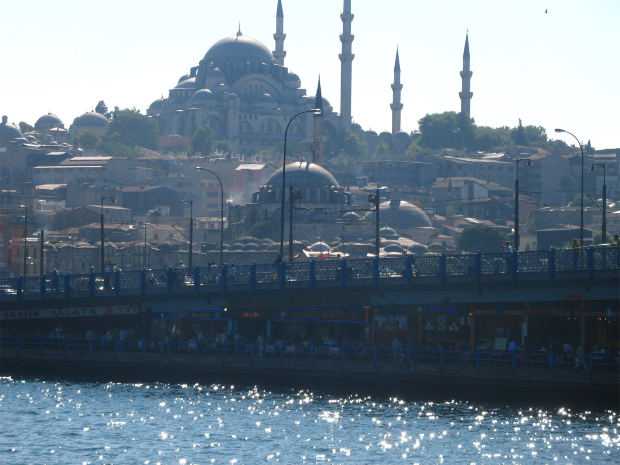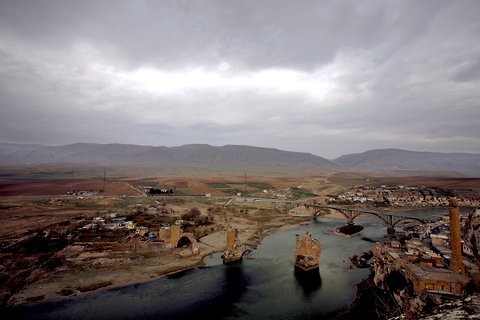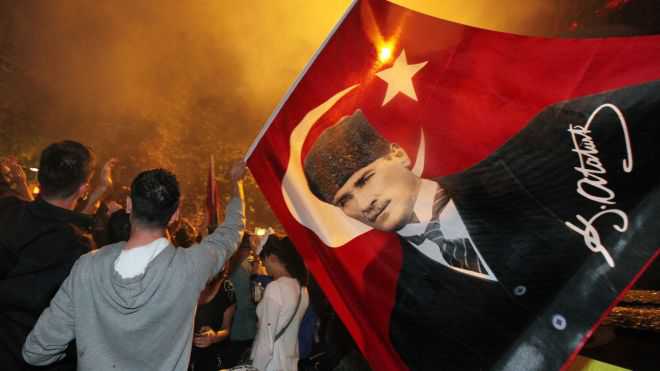|
Some neoconservatives in Washington are obsessed with attacking Iran before President Bush leaves office at the end of this year. Hence, they have been pushing the Bush administration for increased economic and political isolation of Iran in order to weaken its current regime. Crucial to this plan is the support of Turkey, a traditional U.S. ally and an increasingly critical player in the region.
But to the enormous frustration of the neoconservatives, such an attack does not align with Turkey’s interests given its newly enhanced regional ties, maturing democracy, and new foreign policy. Instead, Turkey plays the negotiator role and favors diplomacy and direct talks to resolve the dispute over Iran’s nuclear program.
With neoconservatives pressing for an attack on Iran and Turkey maneuvering to play a mediating role, which way will U.S. policy swing?
Turkey’s Transformation Much has changed in Turkey’s approach to foreign policy in recent years. When the Justice and Development Party (AKP) came to power in 2002, it quickly broke the old patterns of Turkish foreign policy. Turkey’s role evolved from an introverted peripheral country to a significant country with a regional and global influence.
According to this new policy, Turkey aims to play a more active and constructive role in developing relations with its neighboring regions and beyond. “As a major country with a historical and strategic depth in the midst of the Afro-Eurasia landmass, Turkey is a central country with multiple regional identities that cannot be reduced to one unified category. In terms of its sphere of influence, Turkey is a Middle Eastern, Balkan, Caucasian, Central Asian, Caspian, Mediterranean, Gulf and Black Sea country all at the same time,” said Ahmet Davutoglu, the intellectual architect of the new multi-dimensional foreign policy, during an interview on CNN-Turk on January 2, 2008.
A fundamental principle of the new approach is a “zero problems with the neighbors” rule, which has improved diplomatic relations with all of Turkey’s neighbors — most notably Syria, Georgia, and Bulgaria – and boosted trade volumes as well. The share of Turkey’s trade volume with neighboring nations increased from 6% of the total foreign trade volume in 2000 to 35% in 2007.
In addition, a significant Turkish-Iranian rapprochement has taken place, not only because of Iran’s policy against the Kurdish separatists (PKK), but also because of Turkey’s growing energy needs. Trade volume with Iran alone increased from $1 billion in 2000 to over $8 billion in 2007. And in July 2007, the Turkish government signed an agreement with Iran to transport Iranian natural gas to Turkey and Europe and to develop the Iranian natural gas industry by investing $3.5 billion in its South Pars gas field. This figure reaches approximately $10 billion when other contracts, such as for electricity generation, are factored in.
Although Turkey’s enhanced ties with Iran and Syria have caused concern in certain quarters of Washington, this change – stemming from a transparent diversification of the Turkish policy – has not distanced Turkey from the West and Israel. However, Turkey’s clear lack of interest in isolating Iran has prompted neoconservative hardliners, led by former assistant secretary of defense Richard Perle, to undertake a smear campaign against the ruling AKP.
Neocon Attack Frank Gaffney, Daniel Pipes, and Michael Rubin, three leading neo-con writers, have published pieces equating Turkish Prime Minister Recep Tayyip Erdogan with far-right ultra-nationalist politicians such as France’s Jean-Marie Le Pen, Austria’s Joerg Haider, and even Osama bin Laden. They have accused the AKP and Erdogan not only of having a hidden agenda to turn Turkey into an Islamic state, but also of paving the way for an Iranian-style Islamic revolution by Fethullah Gülen, a prominent religious leader known for his moderate and progressive views. Moreover, Rubin defended both the case to shut down the ruling AKP and the coup launched by the Turkish military last year as democratic. These accusations and assertions against the AKP government were harsher even than those made by the government’s own critics. Rubin’s arguments went largely ignored in Washington, since they are in clear conflict with U.S. foreign policy. However, they were more than enough to rally his friends in the Turkish military.
In addition to attacking the Erdogan government, Rubin claimed that Massoud Barzani, the president of the Regional Kurdish Government in Iraq, of selling U.S. arms to the Kurdish separatist group PKK. Rubin even went as far as to boldly suggest that Turkey should capture and imprison Barzani next to PKK leader Abdullah Öcalan in the Turkish island prison of Imrali in order to stop the PKK terror. Once again, although not taken seriously in Washington, Rubin’s arguments were applauded in Turkey by the hawkish wing of the military general staff. His surreal arguments were reflected as “American expert opinion from Washington” in Turkey’s anti-AKP media outlets to create an illusion of international support for their cause.
The neoconservative campaign has had two main goals. The first has been to team up with non-democratic powers within Turkey, primarily some circles within the military as well as the state and the political system, to oust the democratically elected government. A less democratic Turkey with a more dominant and politically active military would be more susceptible to neocon pressure to support a U.S. attack on Iran. The second goal has been to strengthen the Israeli-Turkish alliance by boosting the influence of the more Israel-friendly military circles within the Turkish politics. Not surprisingly, in order to strengthen the position of the military in Turkish society, the neoconservatives have not hesitated to support something the Bush administration has been desperate to avoid: opening another front in the Iraq War by supporting a possible Turkish incursion into northern Iraq to hunt down PKK terrorists..
Neoconservatives have had a deep and continuing interest in Turkey. In the past, Richard Perle has been involved in some lucrative consulting deals and has made some very high-level friends in Turkey. In 1986, he became the co-chair, along with the Turkish general staff, of the U.S.-Turkish consultative defense group. From 1989 to 1994, he worked as an adviser for the International Advisors Inc. (IAI), a lobbying firm started by Douglas Feith and registered as Turkey’s foreign agent with the Justice Department. Perle is also known as the key architect of the Israeli-Turkish alliance of the late 1990s. This alliance has resulted in close military cooperation between the two countries, and Turkey has been an important customer of Israel’s defense industry.
Shifting Geopolitics Despite speculation that Turkey’s importance to the United States would decrease after the Cold War, Turkey remains pivotal to U.S. security interests. The United States depends on Turkey in an unstable region that intersects the Balkans, the Middle East, and the Caucasus as well as Central Asia. Turkey has continued its close cooperation with the United States through both NATO and the UN. It cooperated in the missions in Kosovo and Afghanistan and has participated as well in several key peacekeeping missions such as Sudan and Lebanon. It hosts the Incirlik Air Base, which provides logistical support missions in Afghanistan and Iraq. Seventy percent of U.S. air cargo bound for to U.S. troops in Iraq goes through Incirlik.
But Turkey is no longer dependent entirely on the United States for its geopolitical position. It has demonstrated a willingness to position itself as a regional and global power. In addition to economic and military power, the appeal of Turkey’s soft power has increased thanks to its political and economic domestic reforms and its new perceived image in the neighboring regions as a good example of the coexistence of Islam with democracy and modernity.
Turkey has been playing a key mediating role in several conflicts, including those between Syria and Israel, between Palestine and Israel, and in Lebanon. Syria and Israel just had their third round of indirect talks under Turkey’s mediation in Istanbul. Similarly, the Ankara Forum had several meetings so far and brought the private sectors of Israel and Palestine together to work on possible rapprochement. The Ankara Forum also hosted a meeting between the Palestinian President Mahmoud Abbas and Israeli President Shimon Peres before the Annapolis summit in November 2007. After the 2006 Lebanon war, the AKP government decided to send 1,000 troops – one of the largest contributions – to the UN Interim Force in Lebanon despite harsh domestic opposition. Also, during the recent Lebanon crisis in May 2008, Turkey played the mediator role between the Shia opposition and the Sunni establishment thanks to its good relations with both parties. Its balanced policy toward each group also secured Turkey an active role in bridging the Sunni-Shia divide in Iraq in 2007. It has similarly worked behind the scenes in Iran, Pakistan, and Afghanistan on peace-building efforts. In fact, Turkey is now the only country that enjoys good relations with every country in the Middle East.
Turkey’s willingness to engage hasn’t just been limited to its immediate region. As a result of Turkey’s opening to Africa in 2005, the African Union declared Turkey a strategic partner after China, India, and Japan in January 2008. More importantly, Turkey is now a UN Security Council candidate for 2009-2010; this is an important position where Turkey can use its current experience as a promoter of stability and democracy on a broader level, especially in bridging the divide between East and West.
Turkey’s good-neighbor policy doesn’t extend in every direction. Cross-border operations in Iraq, the Cyprus issue — despite a significant rapprochement with Greece — and the historical dispute with Armenia still pose major potential setbacks.
Moreover, the transformation in foreign policy depends in part on continuity in domestic reforms. The biggest challenge is the high court’s recent attempt to shut down the governing AKP. The groups manipulating the high court to shut down the AKP are the same ones that favor an insulated and more autocratic Turkey. They see both the United States and the European Union as major threats to Turkey’s unity, and have very rigid positions on the Kurdish, Cypriot, and Armenian issues. Therefore, if the AKP is shut down, all of the aforementioned achievements and policy changes will be overturned. Put simply, if these pro-military and anti-AKP forces are successful, they will mark the end of an era of unprecedented reform in Turkish politics, second only to the period of the country’s modern leader, Kemal Ataturk.
Future of U.S. Policy The teaming up of U.S. neoconservatives with pro-military and anti-AKP circles in Turkey in an effort to topple the Erdogan government is self-destructive and has little chance of success, given popular support for a stronger and more pluralistic democracy in Turkey. Moreover, such neoconservative manipulations taint the image of the United States in Turkey, even at a time now when the Bush administration is distancing itself from many neoconservative positions.
The Bush-Erdogan summit in Washington in November 2007 marked the beginning of a new era in U.S.-Turkish relations. The Bush administration put pressure on Congress to squelch a resolution calling on Ankara to acknowledge the Armenian genocide, and Turkey got a more sympathetic audience for its security concerns related to the PKK in northern Iraq. Both sides now keep communication channels open in order to avoid the kind of dips in relations that have taken place in the past.
It is in the U.S. interest for Turkey to play an expanded peacemaking role in the region. But for Turkey to do so, it must continue on its current path of democratic reform. By supporting the military’s return in Turkey and a more hardline approach to Iran, U.S. neoconservatives want to turn the clock back on Turkish reform and plunge the entire region into even greater chaos.
|





